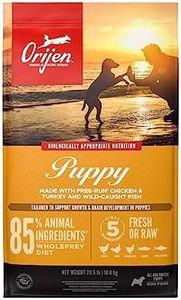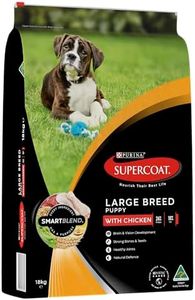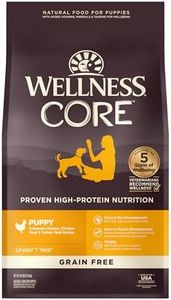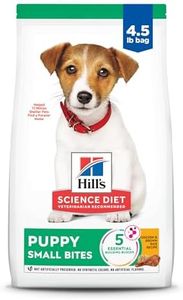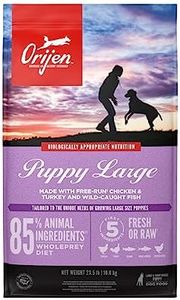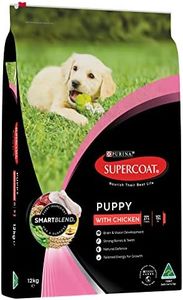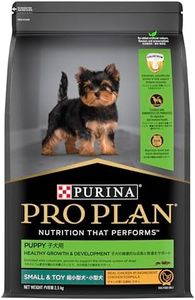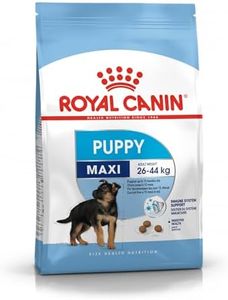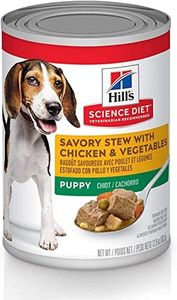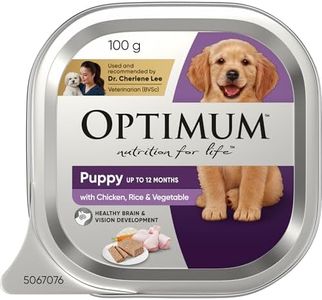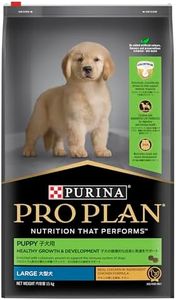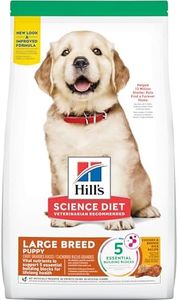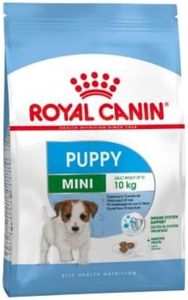We Use CookiesWe use cookies to enhance the security, performance,
functionality and for analytical and promotional activities. By continuing to browse this site you
are agreeing to our privacy policy
10 Best Puppy Dog Foods
From leading brands and best sellers available on the web.By clicking on a link to a third party's website, log data is shared with that third party.
Buying Guide for the Best Puppy Dog Foods
Choosing the right food for your puppy is important because it directly impacts their growth, development, and overall health. Puppies have unique nutritional needs that differ from adult dogs, such as higher protein and specific vitamins to support their rapidly developing bodies. Picking the proper food means looking beyond the branding and marketing claims, and focusing on what's actually inside the bag or can. You should always consider your puppy’s breed, size, activity level, and any advice from your veterinarian before making your final decision.Protein ContentProtein is a fundamental building block for a puppy’s growing muscles and organs. Puppy foods typically have higher protein levels than adult formulas to meet the needs of developing bodies. Protein content is usually listed as a percentage on the packaging. Low-protein foods (in the low 20% range) are generally not recommended for puppies, while mid-range formulas (around 22-26%) suit smaller or less active breeds, and higher protein (27% or more) is often best for large, active, or working breeds. If your puppy is very active or is a larger breed, choosing a higher-protein food can be beneficial, whereas a moderately active small breed may do well with mid-range protein levels.
Fat ContentFats are a concentrated source of energy that puppies need for healthy skin, coat, and brain development. Fat content in puppy foods usually ranges between about 8% and 20%. Lower fat levels are suitable for less active puppies or those prone to being overweight, while higher fat levels are ideal for highly active breeds or puppies with slim builds who need extra calories. Watch how your puppy’s body develops—if they're gaining weight too quickly, a food with less fat might be a better choice.
Calcium and Phosphorus RatioThese minerals are vital for strong bones and teeth. The balance between calcium and phosphorus is particularly important for growing puppies, especially large breeds, to prevent bone and joint problems. The ideal ratio is often around 1.2 parts calcium to 1 part phosphorus. Small breeds are less sensitive to imbalances, but large breeds benefit from precise control in these minerals. If you have a large-breed puppy, look for foods made specifically for large breeds that control these levels.
Kibble Size and TextureKibble size is about how big and hard the food pieces are. Puppies, especially small breeds, have little mouths and baby teeth, so they need food that’s easy to chew. Larger breed puppies may need slightly bigger kibble to slow eating and help dental health. If your puppy is struggling to chew or seems uninterested, you may need to switch to a different kibble size or texture—there are soft, crunchy, and even semi-moist options.
Ingredient QualityGood puppy food has high-quality ingredients such as real meat, named meat meals, whole grains, and beneficial fruits or vegetables. Avoid foods with by-products, artificial colors, or preservatives, as these offer little nutritional value. Reading the ingredient list, you would want to see a named animal protein (like chicken or lamb) at the top, not vague descriptions. If your puppy has food sensitivities or allergies, choosing foods that focus on limited, recognizable ingredients can prevent digestive problems or skin issues.
Added Vitamins and MineralsPuppy foods often include extra vitamins and minerals to support development—like DHA for brain health and antioxidants for immune support. If your puppy came from a shelter or breeder with special nutritional requirements, or your vet recommends specific supplements, check that the food covers these needs. Otherwise, most standard puppy foods will include what’s necessary for healthy growth in normal puppies.
AAFCO StatementAn AAFCO (Association of American Feed Control Officials) statement means the food meets the minimum standards for growing puppies. You’ll see this printed on the bag or can, and it’s a good way to ensure that the food is nutritionally complete and balanced for your puppy’s life stage. Always choose food that is labeled as ‘complete and balanced for all life stages’ or ‘for growth’ to guarantee your puppy gets everything they require.
